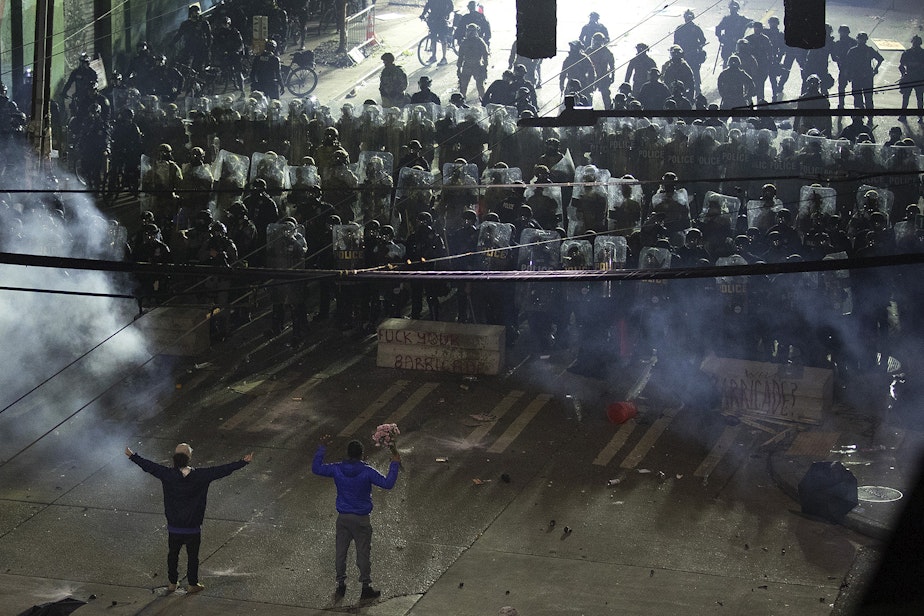Friday politics: How do we make police more accountable?

This week, we've been taking a look at how systemic racism affects our city, our region, and our state.
Joining KUOW’s Angela King were Essex Porter, who covers government and politics for KIRO 7 News, and Sanetta Hunter, a victim’s advocate with the King County Prosecutor's Office and a member of the governor's task force on police use of force.
Police use of force is a big topic right now in Seattle. Sanetta, the governor's task force just held its second meeting last night. So what are the big issues your group is tackling?
Sanetta Hunter: The task force is primarily focused on truly independent police investigations and also a focus on police prosecutions. The current system has repeatedly shown that they simply cannot police themselves. And so we're looking at ways to change that.
Your own son won a lawsuit against the Federal Way Police Department after he was placed in a chokehold. And last month, the city banned the use of chokeholds. How do you see the progress of police reform in the region?
Hunter: Well, certainly my son and and our family and others are grateful to see the city finally come around to ban those chokeholds and neck restraints, which is actually what we wanted from the very beginning.
You know, you simply just cannot ever justify putting your hands around someone's neck just because they're standing in the parking lot. And so we're encouraged by the decision and others like it and hopefully, while we realize it's a long road still ahead of us, but we are hopeful that is the beginning of some real monumental change.
Sponsored
Right now, the King County sheriff is elected by voters. But the County Council decided just this week to let voters decide if the position should be an appointed one. Why does this matter so much, Essex?
Porter: One of the reasons is actually accountability. It turns out that most of the voters live in parts of the county where the sheriff is not the primary police force. So it's those voters who select the sheriff that really polices somewhere else. Those places are represented by the County Council and the county executive.
So the thinking is that the unincorporated places would have a greater voice through their representatives, if the sheriff was appointed. The sheriff was appointed up until 1996.
In any discussion of systemic racism, there is one visible political element and that's representation. The Seattle City Council doesn't have a single Black member.
There's not a single Black member of the state Senate, and Washington state has never sent a Black person to Congress either to the House or the Senate. What's going on there? And how can our political system better represent our citizens?
Porter: Your question reminds me that Seattle Mayor Norm Rice ran for Congress. He was very popular mayor, but didn't win. Ran for governor, didn't advance there. But coming up, we have the primary for the 10th Congressional District race, that's the Olympia area. And there's a reasonable chance that the top two candidates to move on to November will both be Black women. So Washington may very well be poised to send a Black person to Congress.
The same systemic racism that plagues all of our endeavors can be more visible in politics. People have to continue fighting the battle to raise money to get recognition. To be elected to smaller offices and build a structure that lets you move on to higher offices. And of course, you know, it's incumbent on all politicians to represent all their constituents anyway.
This transcript was edited for length and clarity.
This story is part of a weeklong series on systemic racism in our institutions. Here are the interviews:
Race and the justice system: 3 areas to target, according to this Seattle professor
Race matters: Understanding how the Central Area was gentrified
Race is not a health risk factor. Racism is




